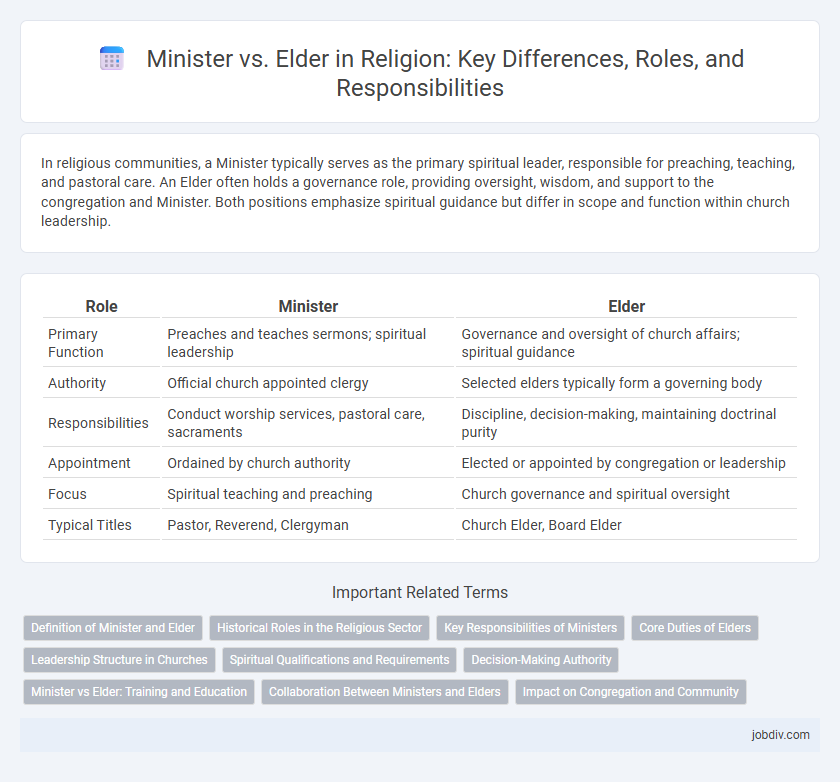In religious communities, a Minister typically serves as the primary spiritual leader, responsible for preaching, teaching, and pastoral care. An Elder often holds a governance role, providing oversight, wisdom, and support to the congregation and Minister. Both positions emphasize spiritual guidance but differ in scope and function within church leadership.
Table of Comparison
| Role | Minister | Elder |
|---|---|---|
| Primary Function | Preaches and teaches sermons; spiritual leadership | Governance and oversight of church affairs; spiritual guidance |
| Authority | Official church appointed clergy | Selected elders typically form a governing body |
| Responsibilities | Conduct worship services, pastoral care, sacraments | Discipline, decision-making, maintaining doctrinal purity |
| Appointment | Ordained by church authority | Elected or appointed by congregation or leadership |
| Focus | Spiritual teaching and preaching | Church governance and spiritual oversight |
| Typical Titles | Pastor, Reverend, Clergyman | Church Elder, Board Elder |
Definition of Minister and Elder
A minister is a religious leader officially ordained to conduct worship services, provide spiritual guidance, and administer sacraments within a congregation. An elder typically holds a leadership role focused on governance, pastoral care, and church discipline, often appointed or elected according to denominational polity. Both roles serve distinct functions in church hierarchy, with ministers emphasizing preaching and sacraments, while elders oversee spiritual oversight and community accountability.
Historical Roles in the Religious Sector
Ministers historically served as primary spiritual leaders responsible for preaching, administering sacraments, and providing pastoral care within congregations. Elders often held governance roles, overseeing church discipline, decision-making, and maintaining doctrinal integrity in early Christian communities. This division of roles highlights the collaborative leadership structure prevalent in many Protestant denominations, emphasizing both spiritual guidance and organizational oversight.
Key Responsibilities of Ministers
Ministers primarily focus on preaching, teaching, and administering sacraments to guide congregational faith and spiritual growth. They often provide pastoral care, counseling, and leadership in worship services, ensuring doctrinal integrity and community engagement. Compared to elders, ministers usually have a more active role in public ministry and church administration.
Core Duties of Elders
Elders in religious communities typically focus on shepherding the congregation, providing spiritual oversight, and ensuring doctrinal integrity. Their core duties include counseling members, leading prayer, and maintaining church discipline according to biblical principles. Ministers often preach and administer sacraments, while elders prioritize governance and pastoral care within the church body.
Leadership Structure in Churches
In church leadership structures, ministers typically serve as ordained clergy responsible for preaching, administering sacraments, and pastoral care, while elders function as lay leaders who provide governance, spiritual oversight, and support for the minister. Elders often form a leadership board or council that collaborates with ministers to make decisions regarding church discipline, vision, and administration. This dual leadership model balances spiritual guidance with organizational management, fostering accountability and shared responsibility within the congregation.
Spiritual Qualifications and Requirements
Ministers are often required to demonstrate formal theological education and licensure, as well as a calling to preach and administer sacraments within their congregation. Elders, by contrast, are typically chosen for their mature faith, spiritual wisdom, and proven ability to shepherd and discipline the church community according to biblical standards. Both roles demand exemplary character, including humility, integrity, and a deep commitment to prayer and scriptural knowledge.
Decision-Making Authority
Ministers often hold formal decision-making authority within religious organizations, overseeing doctrinal interpretations and administrative policies. Elders typically function as senior advisors or moral guides, contributing to consensus-building rather than unilateral decisions. The distinction in decision-making authority reflects varied governance structures across denominations, with ministers generally responsible for final judgments and elders providing consultative support.
Minister vs Elder: Training and Education
Ministers typically undergo formal theological education at accredited seminaries or divinity schools, acquiring advanced training in scripture, pastoral care, and homiletics. Elders often receive leadership training and biblical instruction within their church community, emphasizing practical ministry experience over formal academic credentials. The educational emphasis for ministers centers on advanced doctrinal knowledge, while elders focus on applying biblical principles to governance and congregational oversight.
Collaboration Between Ministers and Elders
Ministers and elders collaborate by combining pastoral care with church governance to strengthen congregational leadership and spiritual growth. Elders provide oversight and accountability, while ministers focus on preaching and counseling, creating a balanced approach to church ministry. This partnership fosters unity and effective decision-making within the religious community.
Impact on Congregation and Community
Ministers often serve as the primary spiritual leaders, delivering sermons and providing pastoral care that directly influence the faith journeys of congregation members. Elders typically offer governance and support, ensuring church discipline and fostering a stable community environment that strengthens collective values. Together, ministers and elders shape the spiritual growth and social cohesion of the congregation, enhancing overall community impact.
Minister vs Elder Infographic

 jobdiv.com
jobdiv.com